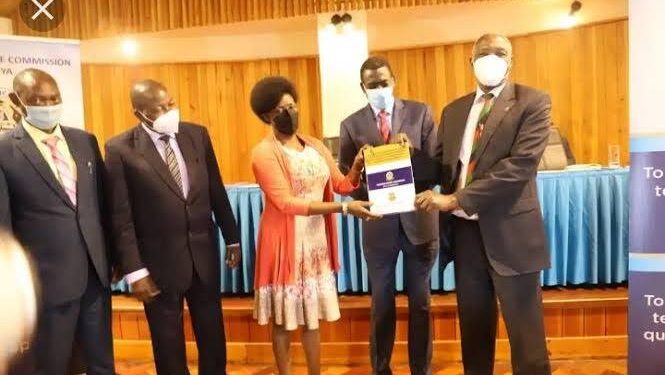Teachers cannot go for teacher professional development (TPD) in April, with lawmakers calling for an immediate closure of TPD courses, unless appropriate stakeholders are consulted.
The legislature also wants the Rs 6,000 training fee to be paid by the government and the list of institutes that offer refresher courses to be expanded.
The details are contained in a report of the National Assembly Education Committee tabled in the House on March 3, just before the legislators went on a two-week leave.
“If the Commission is not prevented from implementing the TPD programme, there is a danger of prejudice to the rights of teachers and stakeholders under Article 232(1)(d) of the Constitution,” said committee chair Florence Mutua, who Signed the report. 1 March 2022.
The report follows a petition submitted on October 5, 2021 by Omboko Milemba, MP for Emuhaya, on behalf of representatives of the Kenya Union of Post Primary Education Teachers (KUPPET ).
In the petition, Milemba raised issues on the cost of the programme, the selection of institutions to offer the course and whether there was public participation prior to the roll-out.
KUPPET and the Kenya National Union of Teachers (KNUT) have argued that even though continuous training sharpens skills, the cost must be borne by the employer.
Proposing the suspension of the programme, the MPs stated: “That TSC should conduct widespread public participation as needed and take into account the views of teachers, trade unions and other stakeholders with a view to building consensus on the programme.”
The proposal is a major setback for the Teachers Service Commission (TSC), which is trying to professionalize the teaching service.
In their findings, the MPs said that teachers will have to pay Rs 6,000 for each module of the TPD.
This means that throughout the teaching career, each teacher would have to take five modules within 30 years, which would translate into a fee of around Rs 180,000.
“This is despite lower salary hikes for teachers, stagnation in the same job group and a reduction in teachers’ settlement income despite rising inflation rates,” the report said.
Mutua argued that the idea that TSC has not made public to teachers and other stakeholders in the education sector is based on arriving at a cost per module.
“The TSC committed the teachers to meet the burden of Rs 6,000 individually for each module of the TPD program without any consultation with the teachers,” Mutua said.
The PTD program aims to benefit all registered teachers in public and private primary, secondary and tertiary institutions in the country.
There are about 750,446 registered teachers in the country. Of these, 341, 760 are under TSC payroll. Another 170,000 are registered and are teaching in private schools. Another 238,686 teachers are registered but not yet employed.
The lawmakers also disclosed that the cost of launching the TPD program is Rs 4.5 billion. However, it emerged that some $2 billion had been set aside for the TPD program.
On institutions offering the courses, the lawmakers said it was not clear why top universities and institutions did not bid despite having adequate infrastructure network, human resource capacity and experience to run the program successfully.
TSC selected Kenyatta University, Riara University, Mount Kenya University and Kenya Institute of Education Management to train teachers through a competitive process.
Mutua said that TPD should have been integrated into the ongoing capacity strengthening programs for teachers on Competency-Based Curriculum (CBC).
“…to avoid duplication of government efforts, waste of public resources and bear the burden of a mandated program for teachers to achieve a well-coordinated and holistic approach,” Mutua said.
The MPs also recommend the enactment of a new law and proposed changes to Article 237 of the Constitution and the TSC Act to resolve the conflict of interest of the Commission being a regulator and employer.
The Committee observed that the TSC has a constitutional and statutory mandate of employer and regulator with the powers conferred by Article 237 of the Constitution and the TSC Act.
“There is a need to set up a separate regulatory agency to address conflicts of interest,” the report said.
On public participation, MPs say that they could not be sure whether public participation was done before the roll-out or not.
“The diverse views and public debate on the program will make teachers more aware and prepared for the implementation of the TPD program as well as program improvement by employers,” the report said.
The lawmakers argue that before the roll out, TSC should have done wider public participation in the program.
The TSC did not involve teachers in the preparation of the policy framework for TPD and its subsequent roll-out, contrary to the mandated requirements of Article 232(1)(d) of the Constitution, despite the fact that teachers are directly affected by the policy. It is,” said Mutua.
The TSC argued that the TPD is anchored in law under section 35(2)(a) of the TSC Act, which states that the commission would require every registered teacher to undertake career progression and professional development programs as prescribed. that may be prescribed by rules made under this Act.

